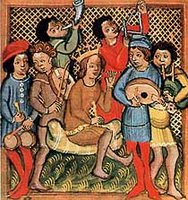9. Sonnet Blog 3: Enter the Arabic er hmmm... European Troubadour
 The troubadour tradition evolved directly from the cross-cultural fusion of Islamic and Western thought from the 9th to the 13th centuries in
The troubadour tradition evolved directly from the cross-cultural fusion of Islamic and Western thought from the 9th to the 13th centuries in The word ‘troubadour’ itself is said to derive form ‘tarab’ meaning ‘transport of joy’. Even today ‘tarab’ is a technical term associated with the Arabic-Perso-Indian family of instruments, referring to the delicate system of sympathetically-tuned strings found on the setar, char tar, tanbur etc which morphed into the Indian sitar, rabab, sarod etc. A specialist in Arabic research into the roots of the troubadour tradition Said I. Abdelwahed has written generally about the Islamic cultural movement of the times and its influence on Medieval Western literature:
The cultural supremacy of the Islamic world in the period immediately preceding the rise of the troubadour lyric is indisputable, and the importance of the Arabic scholarship as a medium for the transmission of Greek classical texts is widely acknowledged and the mastery of the Arabs in composing poetry.......The contacts between Arabic poetry and the Romantic poetry of Muslim Spain arose from the symbiosis of Arabic and Romance dialects in the
 Thus, it is probably in this way that the ghazal first reached the West. Originally it was the 'preface' to the qasida another Arabic performance ode which was often self-accompanied by the ud and other instruments. The qasida along with the strophic zazel were two of the early models for poetic imitation by the troubadour poets who worked in their own language, while absorbing Arabic words, ideas and conventions. The whole idea of writing a love poem was an Arabic one, not European. This trend soon spread to the cultural centre of Europe - Italy through time and poetical 'grafting'. Like a hybridised love-rose, born of the compost of East-West fusion, the sonnet thus evolved as the leading poetical platform of expression for this new courtly craze, coupled with the philosophy of Platonic (celebate) love and the Knights Templar Code of Conduct, laying down guidelines for amorous affairs for women and men of the court.
Thus, it is probably in this way that the ghazal first reached the West. Originally it was the 'preface' to the qasida another Arabic performance ode which was often self-accompanied by the ud and other instruments. The qasida along with the strophic zazel were two of the early models for poetic imitation by the troubadour poets who worked in their own language, while absorbing Arabic words, ideas and conventions. The whole idea of writing a love poem was an Arabic one, not European. This trend soon spread to the cultural centre of Europe - Italy through time and poetical 'grafting'. Like a hybridised love-rose, born of the compost of East-West fusion, the sonnet thus evolved as the leading poetical platform of expression for this new courtly craze, coupled with the philosophy of Platonic (celebate) love and the Knights Templar Code of Conduct, laying down guidelines for amorous affairs for women and men of the court.
Whether directly or indirectly, the Arabic-Persian amatory tradition (with its roots also in mystical Sufism) thus spurred poets to pick up and adapt the new forms to suit their own cultural and linguistic purposes and over time these influences were absorbed and passed on to the next generation of European court poets. Thus, it is not too far-fetched to suggest that the ghazal as the premier form of Arabic-Persian love-poetry literature had a seminal part to play in the evolution of the sonnet, the longest-reigning poetical form in the canon of Western literature.


5 Comments:
Reading this informative blog reminds me of Ezra Pound's love of troubador poetry; his translations of these poems, as well as his own lyrics influenced by them, are among his highest achievements. Whatever one thinks of Pound's later work, his earlier lyrics would repay study by those interested in the ghazal as a lyric form in English.
Dear Chris,
Just finsihed reading you recent submissions in the Ghazal Page and they are really first rate. Your blog with all its refernces is idea provoking. Added it to favorites. "Donkey trails". To a middle aged American this evokes thoughts of Trasure of the Sierra Madre. Perhaps there is a ghazal there.
Dear Bob,
Thanks. Glad you enjoyed them +the blog - I'm working out some ideas there on ghazal origins etc.
And yes, I remember those donkey trails or Sierra Madre. A haggard Bogart in stubble as I recall. I was thinking of actual donkey convoys up the hillsides above Dharamsala, India where they fetch and carry pieces of grey slate from the hillside quarries. But then all dumb-love donkey trails lead to the same big Duh! Huh?
Cheers,
Chris
Salaam Alaikum Dear Chris:
What an excellent and informative blog :) As a lover of poetry and a writer, may I commend to you my book, Master of the Jinn: A Sufi Novel, a mystical adventure tale on the Sufi path of Love and peace. I think you will like it. It has been translated and published in Russia, and will, later this year inshallah, be translated and published in Indonesia, into Bahasa, the national language.
You can view the book and read an excerpt at http://www.masterofthejinn.com
In the Name of the Merciful, 10% of all profits go to charity.
Ya Haqq,
Irving
This comment has been removed by a blog administrator.
Post a Comment
<< Home